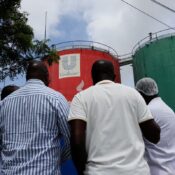
The UN refugee agency has reported that a quarter of Lebanon is currently under Israeli evacuation orders
Naim Qassem, the deputy chief of Hezbollah, stated on Tuesday that the Iran-backed organization would cause “pain” to Israel. However, he also advocated for a ceasefire amid the ongoing conflict in southern Lebanon.
Israel has escalated its attacks on Hezbollah since it initiated incursions into the region last month, following the assassination of Hezbollah leaders and commanders, including its veteran secretary-general, Hassan Nasrallah. This was the most significant setback to the organization in decades.
In a recorded speech, Qassem stated, “The solution is a ceasefire; we are not speaking from a position of weakness. If the Israelis do not want that, we will continue.”
“But after the ceasefire, according to an indirect agreement, the settlers would return to the north and other steps will be drawn up.”
Israel did not provide an immediate response, but it has stated that its operation in Lebanon is intended to facilitate the return of tens of thousands of residents who were compelled to evacuate their residences in northern Israel as a result of Hezbollah attacks.
Qassem stated that Hezbollah has the right to attack any location in Israel, as its adversary has done so in Lebanon. He stated that more Israelis will be displaced and that “hundreds of thousands, even more than two million, will be in danger at any time, at any hour, on any day.”
“We will focus on targeting the Israeli military and its centers and barracks,” he indicated.
Prime Minister Benjamin Netanyahu declared on Monday that Israel would persist in its attacks against Hezbollah “without mercy, in all regions of Lebanon, including Beirut.”
The U.N. refugee agency announced on Tuesday that Israel has issued military evacuation orders that will affect more than 25% of Lebanon. This announcement comes two weeks after the Israeli military initiated incursions into south Lebanon to combat Hezbollah.
The figures emphasize the substantial cost that the Lebanese are incurring as Israel endeavors to demolish the infrastructure of the Iran-backed militant group and defeat it in their one-year-old conflict.
The U.N. refugee agency’s Middle East director, Rema Jamous Imseis, stated that the recent Israeli evacuation orders to 20 villages in southern Lebanon have resulted in the displacement of more than 25% of the population.
“People are complying with these evacuation orders, and they are departing with minimal possessions,” she stated during a Geneva briefing.
According to the Lebanese government, Israeli assaults have resulted in the deaths of at least 2,309 individuals in the past year, and over 1.2 million individuals have been forcibly relocated.
Since the expansion of Israel’s military campaign in late September, the majority of individuals have been slain. The toll does not differentiate between civilians and combatants.
According to Israel, approximately 50 Israelis, including soldiers and civilians, have been slain.
On Monday, Israel intensified its bombardment campaign in Lebanon, resulting in the deaths of at least 22 individuals in an airstrike in the northern region that targeted a residence where displaced individuals were seeking refuge from Israeli strikes in the southern region, according to health officials.
“The information we are receiving is that 12 women and two children were among the 22 individuals who were killed in the attack on Aitou, a Christian-majority region,” stated Jeremy Laurence, spokesperson for the U.N. human rights office, on Monday.
He requested an investigation into the assault, which he claimed has raised concerns regarding “the laws of war.”
Local media reported that rescue personnel were still extracting bodies from the rubble in Aitou on Tuesday. Israel has refrained from providing a response to the Aitou assault; however, it maintains that it implements every feasible measure to prevent civilian casualties.
ANXIETY REGARDING ATTACKS ON PEACEKEEPERS
The primary focus of Israel’s military operations in Lebanon has been the Bekaa Valley in the east, the suburbs of Beirut, and the south. U.N. peacekeepers have reported that Israeli fire has struck their bases on numerous occasions and wounded peacekeepers.
The Israeli military reported that approximately 20 projectiles were intercepted after sirens were activated in the Haifa Bay and Upper Galilee regions of Lebanon, and that they had crossed into Israeli territory.
The specter of sectarian strife has been reignited in Lebanon as a result of the widespread displacement that occurred during Israel’s military campaign.
The political representation of Lebanon is divided along sectarian lines, and the population is composed of over a dozen religious sects. The 1975-1990 civil war, which resulted in the deaths of approximately 150,000 individuals and the involvement of neighboring states, was exacerbated by religious divisions.
Despite apprehensions regarding civilian casualties, the United States has maintained its support for Israel in its conflicts. According to a statement issued by the Pentagon on Tuesday, components for an advanced anti-missile system began arriving in Israel on Monday and are expected to be fully operational in the near future.
A year ago, the militant group resumed firing missiles at Israel in support of Hamas at the onset of the Gaza war, thereby reigniting the Israel-Hezbollah conflict.
Meanwhile, the Middle East is on high alert in anticipation of Israel’s retaliation against Iran for the missile bombardment that was launched on October 1 in response to Israel’s raids on Lebanon.
All Categories
Recent Posts
Tags
+13162306000
zoneyetu@yahoo.com


